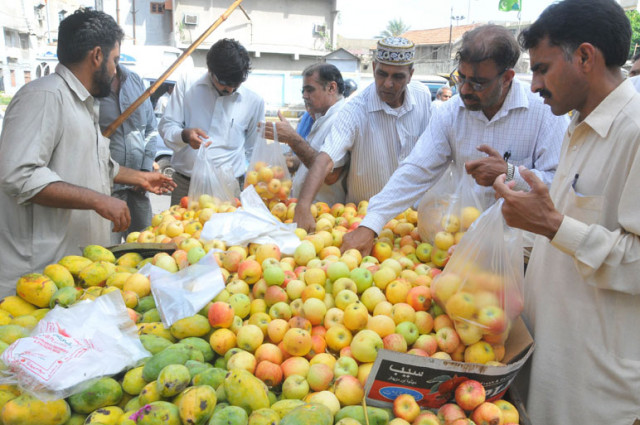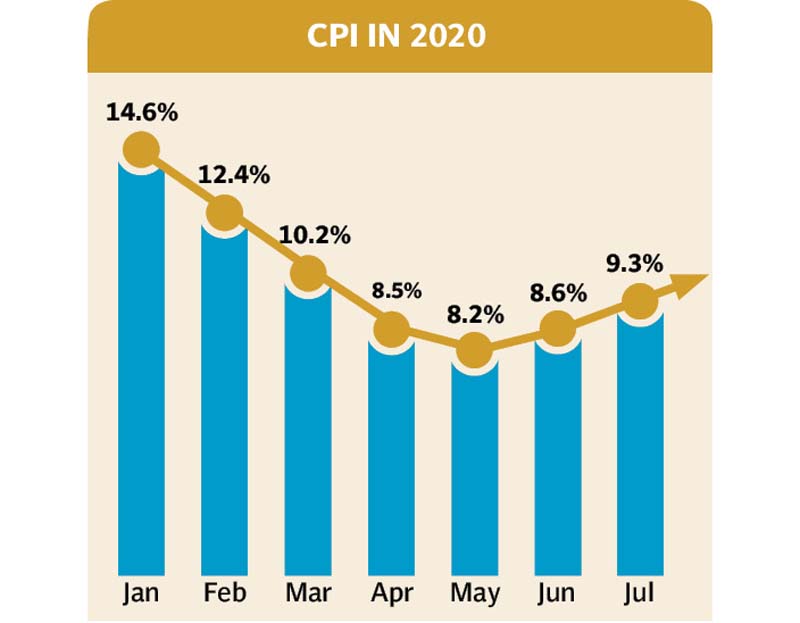Inflation rises 9.3% in July
Increase comes on back of surge in food and petroleum product prices

The key inflation barometer rose sharply - for the third successive month - to 9.3% in July 2020 over a year ago due to a surge in food and petroleum product prices amid failure of federal and provincial governments to keep prices of kitchen items in check, particularly wheat and sugar whose rates have surged in double digits.
Measured by the Consumer Price Index (CPI), the average rate of increase in prices of goods and services stood at 9.3% in July, reported the Pakistan Bureau of Statistics (PBS) on Monday.
On a month-on-month basis, inflation rose 2.5% in July over May - the steepest surge since the PBS - the national data collecting agency - started reporting inflation numbers under a new methodology.
There was a massive increase in prices of perishable and other essential kitchen items. Tomato prices increased almost twofold on a month-on-month basis and 100% on a year-on-year basis, according to the PBS. Petrol prices increased 27% last month.
The increase in prices of petroleum products, food and beverages fuelled inflation in the country. But it may not be offset by the State Bank of Pakistan (SBP) through monetary tightening. Compelled by the spread of coronavirus and increased political pressure, the central bank has cut the interest rate to 7% after keeping it at 13.25% till March 17, 2020.
The SBP has deferred the announcement of new monetary policy till next month, which was due in the last week of July. The central bank delayed the announcement on grounds that it had held numerous meetings of the monetary policy committee to respond to the challenges posed by the spread of the respiratory disease.
The central bank expects average inflation to stay in the range of 8-9%% in the current fiscal year, which is higher than the 6.5% target set by the federal government for fiscal year 2020-21.
Core inflation, measured by excluding food and energy goods from the commodities’ basket, eased to 5.3% in July, according to the PBS. The core inflation had been 6.5% in June.

Food inflation in urban areas increased from 12.9% to 15.1% and in rural areas it increased from 15.2% to 17.8%, reported the PBS.
Prices of food and non-alcoholic group increased nearly 18% over a year ago. Non-perishable food group prices rose about 17% and prices of perishable food items on an average increased 23%, according to the PBS.
The real challenge for the Pakistan Tehreek-e-Insaf-led federal and all provincial governments was to check prices of staple food and sugar. Despite Prime Minister Imran Khan’s interest in controlling prices of wheat, wheat flour and sugar, the rates have been increasing constantly.
The federal government’s decision on import and export of wheat and sugar has a direct bearing on prices in the domestic market.
The PTI government has failed to ensure availability of sugar and wheat at affordable prices, particularly for the low-income groups.
PBS reported that wheat prices increased 28.5% in July over a year ago. Prices of wheat flour surged 18.5% and other wheat products by 16% in July over a year ago, according to the PBS.
After exporting wheat, the PTI government is now in the process of importing 1.5 million tons of wheat that will cost the national exchequer a minimum $480 million at current international market prices.
Sugar prices also increased 17% in July over a year ago, according to the national data collecting agency.
In its March and May 2020 meetings, the Sugar Advisory Board (SAB) reported that there were sufficient stocks of sugar and the country would have 271,000 to 291,000 tons of surplus sugar in December 2020, according to the Ministry of Industry’s summary presented to the Economic Coordination Committee (ECC). Sugarcane crushing season starts in November and December every year.
However, in its meeting on July 22, 2020, SAB showed “unusual consumption” of over one million tons of sugar in a month, which was far higher than the national monthly average of 422,000 tons in the previous many months.
On the basis of one million tons of consumption, the ECC allowed import of 300,000 tons of sugar, according to a statement of the Ministry of Finance.
PBS reported that there was an increase of 5% in prices of the alcoholic beverages and tobacco group. Prices in the housing, water, electricity, gas and fuel group rose 4.2% in July over a year ago.
Published in The Express Tribune, August 4th, 2020.
Like Business on Facebook, follow @TribuneBiz on Twitter to stay informed and join in the conversation.



















COMMENTS
Comments are moderated and generally will be posted if they are on-topic and not abusive.
For more information, please see our Comments FAQ